You find yourself amidst the worst public health crisis for a generation. The muddled thinking at the heart of government is not engendering confidence. The spectre of mass deaths and possible chaos in an under-funded health service hangs over ministerial indecision. Politics has become laughable. Comedy has become political. Great satire troubles the comfortable and consoles the afflicted. You should be watching NBC’s Parks and Recreation.
Parks and Recreation is an American political satire TV sitcom created by Greg Daniels (The Office and King of the Hill) and Michael Schur (The Office and The Good Place). The series, which stars Amy Poehler as Leslie Knope, a small-town councilwoman in the Parks Department of Pawnee, a fictional town in Indiana, aired on NBC from 2009 to 2015, over seven seasons. Throughout its run, Parks’ received wide critical acclaim, achieving several awards and nominations, including six Primetime Emmy Award nominations (two for Outstanding Comedy Series); a Golden Globe Award win for Poehler’s performance; and the Television Critics Association Award for Outstanding Achievement in Comedy. Parks’, while reasonably short-lived, has become critically beloved and is now widely recognised as the funniest, sweetest, most consistent sitcom on television, due to the close, personal connection that audiences feel to the characters and Pawnee.
Like all great satire, Parks and Recreation explores many deep philosophical questions through the needs, wants and desires of its multi-layered characters. As Deputy Director of the Parks Leslie Knope best exemplifies when attempting to be clear about her purpose and priorities in life (as a dedicated, mid-level bureaucrat), “We need to remember what’s important in life: friends, waffles, work. Or waffles, friends, work. Doesn’t matter, but work is third.” Just as coffee and cherry pie are key to unlocking new meanings in Twin Peaks, everything, from the warm, golden breakfast food in Parks’, not to mention the child-sized sodas on sale at dishonest candy company ‘Sweetums’, begs to be read and reread – especially during cultural chaos.
Here’s why you should take a deep dive into the absurd yet immensely enjoyable antics of an Indiana town’s public officials as they pursue sundry projects to make their city a better place. Parks and Recreation matters. If we journey deep beyond the surface of the sitcom’s subtle humour, we can find a series of recurrent questions raised, through the contemporary social and political issues that quietly abound in each episode. Parks’ storylines seem intentionally pedestrian (the town’s prized pony goes missing, for instance, a few friends take a road trip), but the show also grapples with weighty themes like capitalism, democracy, existential crisis, feminism, idealism, leadership, race relations, society and government, and much more (such as possum ethics).
In one particularly pertinent episode, aptly titled “Emergency Response” (S5, E15), the department has to put together a last-minute fund-raising gala for a new park without deputy director Leslie, who has been called away on an emergency disaster drill. When the drill is found to be the nefarious work of a competing councilman, hoping to tank the gala, Leslie hatches her own plan to expediate the bogus drill – she attempts to ‘kill’ every resident of Pawnee with the simulated avian flu. Flu vaccines are soon flushed down the toilet and police are instructed to give CPR to all the infected birds in the area. “Our top priority is now, saving all the birds!,” declares Leslie. The chaos that transpires is driven by the government’s shambolic response to the simulated pandemic (which results in the townsfolk being left without a cure) and the ineffectiveness of the local media (Pawnee’s leading reporter, Joan Callamezzo, is too hung-over to work, yet refuses to leave the set [because, you know, screen-time equals dollars). Nonetheless, despite figuratively destroying Pawnee, Leslie completes the drill, and comes to find that her friends (colleagues) have learned what to do in her absence as the gala commences resulting in their raising enough funds for a beautiful new park for the community.
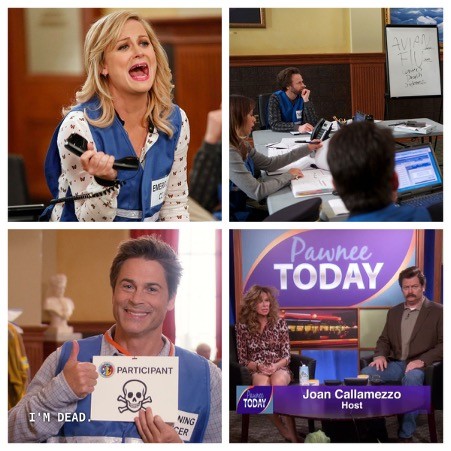
Fig. 3: An unfolding pandemic and vaccine fiasco cause local government, the media and townspeople to descend into chaos
Parks’ is a remarkably humane sitcom: a beautiful testament to the power of friendship, a quietly consistent argument for feminism and a comedy machine on par with The Simpsons. But it is also a sustained, deep argument for a kind of confident liberalism that is almost entirely absent from other popular series and that almost always seems under threat in real-world politics. Ever-optimistic heroine Leslie Knope, the hyper-competent and incredibly enthusiastic public servant, who leads the series, somehow constitutes an antidote to an exceptionally cynical era. For instance, when an actual flu outbreak strikes Pawnee in another particularly relevant episode, “Flu Season” (S2, E3), unrelenting enthusiasm transpires when Leslie strives to bring back a defunct Harvest Festival, despite being stricken with the flu.
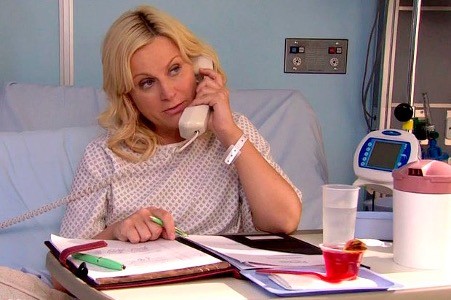
Fig. 2: Leslie Knope gets the flu right before an important fund-raising pitch for the Harvest Festival
In another apt episode, “Freddy Spaghetti” (S2, E24), thanks to a huge budget deficit, Pawnee’s government is shut down and the parks are closed. Naturally, Leslie attempts to resist the lockdown by proving that she is essential staff, whilst skirting the rules to hold a children’s concert in the vacant lot. Parks’ is notable for its vivid and confident liberalism and deep considerations of the role of government, both of which arguably make the sitcom strikingly more sophisticated than almost any other competitor. This series so regularly transcends the often-dull sort of political speechifying of its polar opposites, such as supposedly cynical political thriller series House of Cards.
This astonishingly textured world is populated by characters who defy stereotypes, including upbeat, over-achieving civil servant Leslie and one of the most indelibly conservative characters ever to grace television, Ron Swanson (Nick Offerman). Director of the Department, Ron, holds a wildly different vision from his deputy, and main protagonist Leslie, whom he shares an enduring friendship with. For example, while Leslie works tirelessly to transform a gigantic pit of dirt in a vacant parking lot into a playground (in the face of a timely enemy: a budget crisis), Ron can be found planting philosophical seeds (à la John Locke) in the minds of the local school children, quietly schooling them (and us) on anarcho-capitalism, libertarianism, politics and privatisation. As the moustachioed alpha male blithely suggests, “Capitalism is God’s way of determining who is smart and who is poor.”
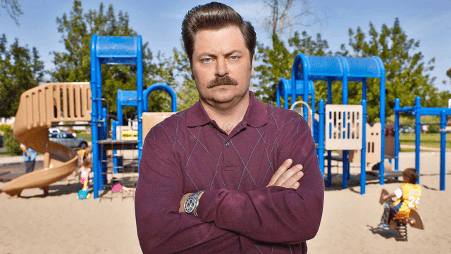
Fig. 4: Local government manager and staunch libertarian, Ron Swanson, strives to make his department as least effective as possible.
Assistant to Ron is April Ludgate (Aubrey Plaza), frightfully disinterested, sarcastic and dry, April works diligently to fulfil Ron’s belief that government should essentially wither and die. Yet, each character, whose philosophies tend to run perpendicular to each other, busts a gut in the battle of ideas, which in turn makes them a better, sharper, smarter public servant. Parks’ deep and surprisingly-complex call for bipartisanship finds real value in opposing forces. As Leslie insists. “I love this town. And when you love something, you don’t threaten it. You don’t punish it. You fight for it. You take care of it. You put it first.”
In recent times, television comedy has become wary of such outright idealism. Joy and optimism too easily curdle into smugness on screen and are often difficult to express well in popular TV. The mockumentary style that defines Parks’ hasn’t killed comedy, but perfectly skewers how we now live. Parks’ remains aspirational. It doesn’t seem revolutionary, but it is. The sitcom isn’t so much a comedy about politics as it is about people – or rather, about how politics is people. As the sitcom so sincerely exemplifies, sometimes our only option, when faced with the darkest dealings of our most revered institutions, is to resuscitate the Harvest Festival of our minds, one corn maze and plus-size roller coaster at a time, to counter the bitter deficit of life.
Dr Victoria McCollum is a Lecturer in Cinematic Arts at Ulster University, Magee. Victoria’s research interests include contemporary horror, popular television shows and the cultural history of Halloween. Her recent publications include a monograph Post-9/11 Heartland Horror: Rural Horror Films in an Era of Urban Terrorism (Routledge, 2016) and a number of edited volumes including HBO’s Original Voices: Race, Gender, Sexuality and Power (Routledge, 2018); Alternative Media in Contemporary Turkey: Sustainability, Activism and Resistance (Rowman & Littlefield 2019); and Make America Hate Again: Trump-Era Horror and the Politics of Fear (Routledge, 2019). Victoria has previously held positions at BBC, ITV, MTV and HBO (Time Warner Inc).


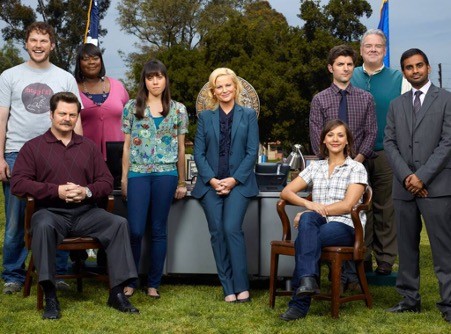
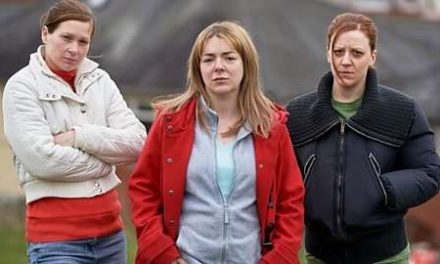

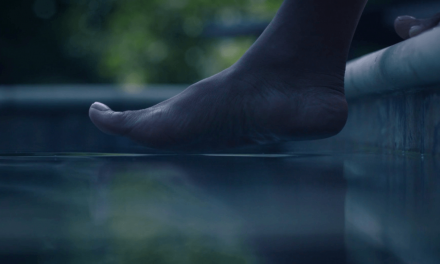

Thanks very much indeed for this Victoria. “Parks and Recreation” is duly added to our list of “stuff to watch out for” in the future. I love the way that you describe it, and it sounds *very* much to our tastes. I’m trying to work out now why we never saw it. I know that we were aware of it because it had featured on a BBC documentary about trends in UK and US sitcoms prior to its UK premiere and had caught our attention… but for some reason when it arrived in BBC Four’s schedules in 2013 it didn’t form part of our own weekly viewing. Which is a shame, as it sounds like we’ve missed out.
But – yes – a wonderful recommendation! Very much appreciated. Always happy to be on the look out for neat stuff.
All the best
Andrew